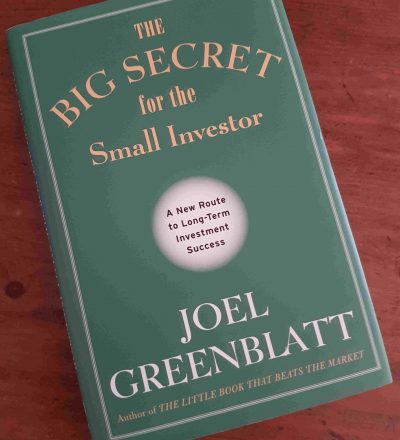The Big Secret for the Small Investor – Book Review

Premise of the book
The average investor has an edge over professional money managers. From dealing with bosses who demand short-term profits, to panicky clients who take flight as the first sign of under-performance, professional asset managers have a lot of hurdles in their way. Fortunately for the small investor, investing works best over the long term (decades, not years) and most professional money managers can’t take advantage of that.
The book details three strategies to beat the market.
About the author
Joel Greenblat is a professor at the Columbia University Graduate School of Business, a successful hedge fund manager, and former Fortune 500 chairman. He has published numerous books on investing such as You Can Be a Stock Market Genius (1996) and The Little Book That Beats The Market (2006) but his latest book, The Big Secret for the Small Investor (2011) is by far his best.
Structure of the book
The book is divided in three parts.
The first part recaps the fundamentals of investing (the importance of earnings, how to value a company, how to calculate discounted earnings, and the concept of the margin of safety). It also touches upon why it pays to do your research in the stock market.The author elaborates on these concepts with simple examples which are understandable to the new investor. The book also cuts to the point and this won’t be a 300 page books as to why you should care about the Price to Earnings (PE) ratio. If you’re looking for a concise yet comprehensive book on investing that won’t bore you with hundreds of examples, then this is the one for you.
The second part goes over the challenges professional money managers face. The author draws on his own experiences as a hedge fund manager. The book explains both the fundamentals of investing and how it connects to the irrational exuberance of the market, i.e. you can do your research, find a great company with great potential that is trading at a great price, but as long as the market hasn’t realised it, the stock price won’t grow, and you won’t make any gains. Now, the small investor can hold on to this winning stock and, over the long-term, the market is bound to recognise this great company and its share price will rise. The small investor can make great money by being patient, but professional money managers can’t. here’s why:
1. Asset managers make money by extracting a management fee on the volume of cash they manage. In essence, the more cash you place in mutual funds, the more they get paid. As such, there is a monetary interest to attract as many investors as possible. With thousands of mutual funds available, competition is fierce and mutual funds must deliver the best performance to attract the most investors. Here’s the problem: To make great gains, professional asset managers must find amazing companies at amazing prices, essentially they must be one of the first to find this company. Being first is great, you will make huge gains, but only when the market realises it too. Until then, you are holding on to a company whose share price isn’t increasing, and you may actually under-perform the market in the short term.Investing is a long-term game and it rewards long-term investors greatly. Unfortunately for mutual funds, they don’t have the luxury to wait long-term, their clients and bosses expect results now. Investors aren’t stupid, if the mutual fund does not deliver satisfactory gains, they will take their money out, the volume of investments will decrease, and mutual funds will not make as much money from management fees. Sadly this translate in most asset managers aiming for short-term profit instead of long-term gains.
2. Mutual funds have clients too, they’re called funds of funds. Funds of funds don’t pick stocks, they pick mutual funds. They try to pick the best performing mutual funds for their clients in an effort to secure greater profits. As such, if a mutual fund isn’t performing well ( because it may simply be ahead of the market) the funds of funds may cash-out and select a different mutual fund. This means the mutual fund has lost yet another client simply because they were ahead of the market.
3. Mutual funds managers are people too. Just like us, they care about their job, their bonus, and a possible promotion. If a mutual fund manager placed everything in bitcoin in 2009, the fund would have made a fortune, but if the price dropped, the manager would have been called crazy, would probably be fired, and no-one would hire this lunatic ever again. So what do mutual funds manager do? They buy safe stocks. You can’t go wrong picking Amazon, Apple, Microsoft, or Coca Cola. If the stock under-performs, mutual funds managers can simply blame the market or the company CEO, and the manager can keep their job. Pick bitcoin and you can’t blame anyone but yourself. As a result, mutual funds cannot take on much risk, but the small investor can.
4. Mutual funds cannot pick future winners. Yes they can select confirmed winners such as Tesla or Amazon, but they can’t invest in up and coming companies. Due to regulations, mutual funds have limits to how much they can invest in each stocks. Sometimes the existing rules only allow mutual funds to own up to 5% of a company’s shares. As all winners start as small companies, even if a mutual fund found Bill Gates in his garage 40 years ago, the fund would not have been allowed to buy more than 5% of Microsoft shares. As Microsoft was a tiny company, a 5% stake would also have been tiny, and to most fund managers, such a tiny position would not be worth the time and effort to conduct a proper investment analysis. On the other hand, a fund would have multiple financial analyst reviewing the top firms every day. So while it may be very difficult to beat mutual funds on large-cap stocks like Apple or Pepsi co, you can beat them where they don’t play: small cap firms.
Investing is a long term game, and fortunately for us, mutual funds cannot think long term. Let’s see how we can beat their returns.
So what's the big secret?
The author has tactfully made references to his big secret time and time again in his book, promising you that his secret will help you beat the market, so what is it?
In part three, the author concludes his book by recapping what we’ve learned:
1. Most investors do not beat the market, in fact their lack of expertise in evaluation companies, lack of patience in finding the right entry price, and lack of knowledge in how to structure a stock portfolio cumulates into stock market gains that are even smaller than mutual funds;
2. Most mutual funds do not beat the market over the long term. Mutual funds are constrained to short-term profits and focusing on large established companies that are reviewed by hundreds of financial analysts. It is difficult to get an edge in there.
3. Traditional index funds guarantee that you match the market but investing this way is seriously flawed. Yes, you read that right, the author is bashing index funds while everyone is praising them, what’s that about? Greenblat’s argument is that an index funds tracks the evolution of the market after it happens. This means that if Facebook grows by 2%, the traders managing the index fund would buy additional shares in Facebook and sell some other company’s shares to make space for it. This allows the index fund to track the market. However the tracking happens AFTER the increase. As explained in the first part of the book, the author reminds us that a successful investor should buy an undervalued company (i.e. a company that the market has not priced accurately yet) and sell it for a profit. An index fund would not buy shares before the price increase, but after. While this approach to capitalisation weighted index funds will match the market index, the author argues there is something even better.
4. Equal-weighted index funds should beat capitalization weighted index funds over the long term. As a capitalization weighted approach is flawed (because we are buying after the increase in share price), Joel Greenblat makes the argument that index funds that are equal weighted (e.g. you would own 0.2% of each stock in the S&P 500) should have outperformed the market by 1.5% to 2% over the last two decades before fees.
5. Fundamentally weighted index funds should beat equal and capitalization weighted index funds over the long term. If capitalization weighted index funds are flawed as they buy after the share price has increased, and if equal-weighted index funds are flawed since they must be continually adjusted everyday and thus leads to excessive trading fees which drag down performance, then maybe we should not focus on the whole index or how big each company is, but on the fundamentals of each company. Stock prices go up and down like a yoyo, but eventually they always revert back to the stock fundamentals. If earnings are continuously growing, then the stock price will grow accordingly. The idea here is that buying companies according to their fundamentals and not just their stock price should increase returns over the long time as you ignore the irrationality of the market.
6. Value weighted index funds should beat all the above. If we combine all the best elements of the above, and we look to buy companies that are undervalued, then a value weighted index fund should beat both the market and all other forms of index funds over the long term. But if that’s true, why isn’t everyone investing in this way? Well, as mutual funds manager know all too well, prices of great company can stay low for a very long time, and owning the stock for a while may drag on your performance. Make no mistake, the market will value this amazing company eventually, but it may take time. As a result, value weighted index funds may under-perform the market for several years in a row. From 1990 to 2010, the value weighted index fund would have under-performed the market on 5 years, and over-performed on 15 years.
According to the research highlighted in the book, from 1990 to 2010, investing in a capitalization weighted index funds tracking the S&P 500 would have averaged an annual return of 7.6% while a value weighted index fund would have delivered an annual return of 13.9%! Now that is a huge difference over the long term. The caveat? Some years capitalization weighted index will perform better, and many investors may feel like pulling their hair out for abandoning the sure thing that are capitalization weighted index funds.
The verdict
Joel Greenblatt sums-up the basics of investing in a few short chapters. Not only are they well written and easy to understand but Greenblat does not waste our time, his chapters are concise, to the point, and comprehensive.
Greenblatt makes a strong case for reforming our approach to index fund investing but he also acknowledges that the strategy is reserved to those with a stomach strong enough to hold on to the strategy when they appear to under-perform in the short term.
If you’re happy with the returns of the market (traditionally referred to as capitalization weighted index), and feel safer investing with the crowd, there is no shame in sticking to your traditional index fund, they still perform very well over the long term and beat most investors and mutual funds over the long term.
